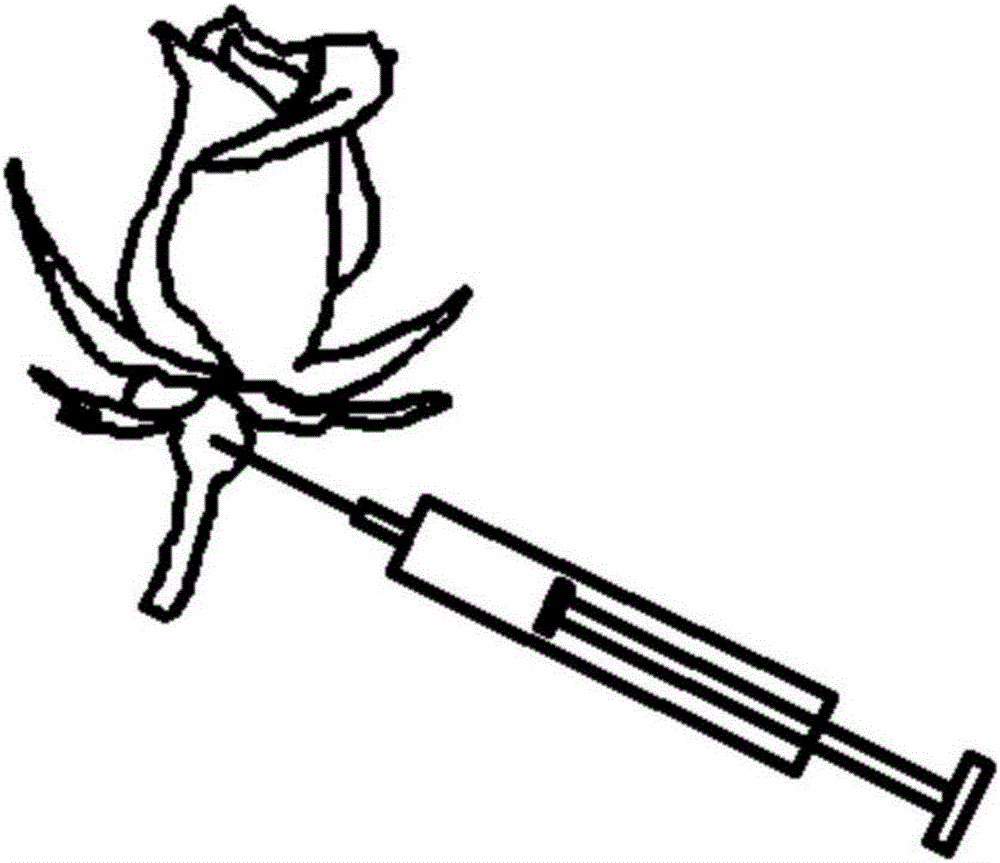Cultivation method for rose variety by composite hybridization
A composite hybrid and rose technology, applied in the field of plant cultivation, can solve the problems affecting the process of hybrid breeding, unstable variety characteristics, and abortion of pollination stigma, and achieves the effects of elegant and pure fragrance, lasting green leaves of roses, and long flowering period.
- Summary
- Abstract
- Description
- Claims
- Application Information
AI Technical Summary
Problems solved by technology
Method used
Image
Examples
specific Embodiment
[0043] An experimental field was established in Zibo, Shandong Province, and healthy parents with no disease and pests were selected, and the male parent line B Tibetan rose (Rosa webbiana Wall.ex Royle) was carried out on the female parent A line Shandong red rose (rosa gugosa cv.plena) Early or delayed artificial pollination. Carry out manual daily management after hybridization, and collect good seeds. In the second year, the hybridized seeds F 1 Sow the seeds separately, compare and identify, select the better plants among them, and use it as the female parent to carry out artificial pollination with the male parent C line Rosa davurica Pall in advance or delay again. Carry out artificial daily management after pollination, and collect good seeds F 1 C, F 1 C was then purified by selfing to obtain F 2 c. Then, the derivation system method was used to screen the excellent plants, and a new rose plant with ideal flower leaf shape, plant flower yield, fragrance type and ...
Embodiment 2
[0074] No. 2 Zhongtian Rose (ToproseNo:2) of embodiment 1 is carried out stress resistance experiment, specifically as follows:
[0075] Cold resistance: In the greening of a square in a certain district of Heilongjiang Province, 4,000 Zhongtian Rose No. 2 (Toprose No: 2) were planted for a winter cold resistance experiment. Years and later there is no phenomenon of stripping. Through practice, in the first year of planting, water control and fertilizer saving measures are taken to prevent excessive growth of planting strips, so that they can fully form wood quality, and better solve the problem of safe overwintering at minus 38°C.
[0076] Salt-alkali resistance: In cooperation with Tianjin TEDA Landscaping Company, jointly undertook the "948" plan of the State Forestry Administration - the introduction of saline-alkali land treatment technology in Binhai New Area, and carried out the test of Zhongtian Rose No. 2 (Toprose No: 2) as an important salt-tolerant plant test. The...
Embodiment 3
[0084] The flowers of different rose varieties are extracted with steam distillation. The extraction process parameters are: liquid-to-solid ratio 4:1, distillation time 4h, distillation speed 200mL / h (distillate of 10% distillate volume per hour) ), the charging capacity is 75% of the distiller. The experimental results are shown in Table 3.
[0085] table 3
[0086]
[0087]
[0088] From the data in Table 3, it can be seen that the rose balm oil rate of the present invention reaches 0.053, which is higher than the Damask rose with high oil at present.
[0089] The chemical composition was determined by capillary gas chromatography-mass spectrometry.
[0090] Instrument: GC / 7AG chromatograph (Shimadzu, Japan), analytical column: quartz capillary column, 50m×0.3m, column temperature 80-180°C, 2°C / min temperature program, vaporization temperature 240°C, carrier gas is N 2 , the carrier gas flow rate is 60mL / min, and the injection port temperature is 240°C. Mass spect...
PUM
 Login to View More
Login to View More Abstract
Description
Claims
Application Information
 Login to View More
Login to View More - R&D
- Intellectual Property
- Life Sciences
- Materials
- Tech Scout
- Unparalleled Data Quality
- Higher Quality Content
- 60% Fewer Hallucinations
Browse by: Latest US Patents, China's latest patents, Technical Efficacy Thesaurus, Application Domain, Technology Topic, Popular Technical Reports.
© 2025 PatSnap. All rights reserved.Legal|Privacy policy|Modern Slavery Act Transparency Statement|Sitemap|About US| Contact US: help@patsnap.com



